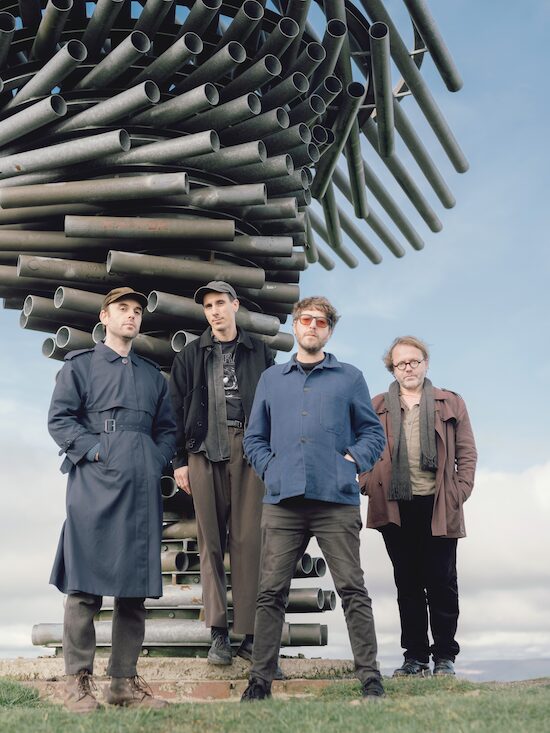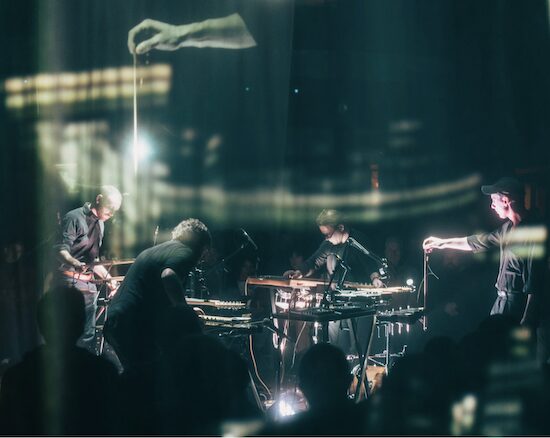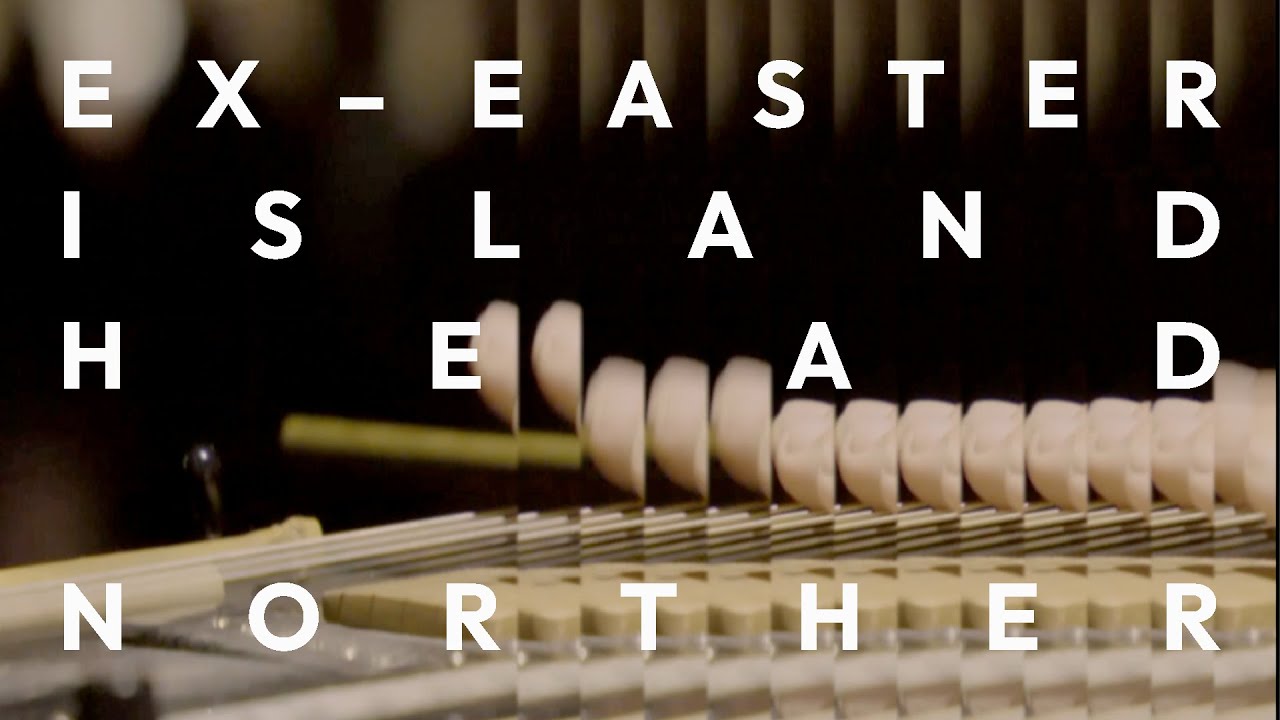It’s the sort of weather that could go either way. A flat layer of cloud acts as a filter for an otherwise glaring sun, casting the two dirty-white domes of Bidston Observatory in a strange, silvery light. The wind is blowing our hair about. I ask Duvall what the wind is like, as a bandmate. “Elusive.” he says, then thinks for a while and adds: “And very capricious.”
Duvall and I are on the roof of a building built on what he claims to be the highest point in the Wirral, but he doesn’t sound so sure. The observatory was built in 1866 and ever since then has acted as a factory of prophecy, churning out astronomical analyses, weather forecasts, tidal predictions, and now it’s an artistic research centre which somehow feels the same. The building itself is constructed entirely out of the stone that was mined to make the cellar. Right now Duvall is telling me about making aeolian harps in the basement, and then bringing them up onto the roof.
“The way the wind harp sounds is almost identical to the way we approach the guitar.” he explains, referring to his band Ex-Easter Island Head, the Liverpudlian three-piece turned four-piece (or five-piece if we’re counting the wind), who formed in 2009 and, generally speaking, play guitars with mallets. For their upcoming album Norther, the band added a home-made aeolian harp – a catch-all term for string instruments played by the wind – to their otherwise relatively minimal and relatively standard roster of instruments. On the railing between the observatory domes you can still see the zip-ties that once held the makeshift harp in place. Using this instrument, Duvall managed to record an actual norther, a strong wind coming in cold from the north, and you can hear it on the title track: a cool, high, feedback-like hum that sails above the song, and lingers after it.
This overtone, as Duvall repeatedly refers to it, is key to E-EIH’s process. The band deals in hidden music: not the notes played, but the byproducts of play. The wind harp, Duvall explains, works in much the same fashion, with the wind never playing the fundamental note that the harp string is tuned to. Instead it brings out the harmonics, the partials. All these side-effects are promoted to centre stage on Norther. Duvall describes how the very function of the observatory, too, is to foreground otherwise hidden information. “The building is here to capture the invisible and render it into something tangible.” he shouts over the wind. “We do a bit of that.”
This isn’t the first time Duvall has alluded to ‘capture’ when describing his artistic endeavours. Earlier he noted that the significance of the wind harp’s string being made of fishing line wasn’t lost on him. Now, gesturing from the rooftop towards the thin white turbines protruding from the Irish Sea, he notes that the entire landscape before us has been repurposed for the exploitation of wind. I ask him to what extent these terms – capture, exploit – represent his own relationship to the wind and to his music. “[Humans] tend to think in terms of ‘What can I get from this?’” Duvall responds, “or ‘What can this thing give me?’” But in the same breath he suggests that perhaps the image of the wind harp as a receiver, channelling the currents, is more apt. The unpredictability of the wind means that any real attempt to control or dominate it would be in vain.
It’s precisely this temperamentality, this “inbuilt randomness” as Duvall describes it, that has proven a source of inspiration while recording Norther. In order to produce the blustering, rain-like sounds that patter across the album’s opening track, Duvall and his bandmates constructed their very own six-note randomisers out of the vibration motors of mobile phones. With their guitars, as always, laid flat before them, they dangle the motors so that they dance lightly across the strings, flittering from one note to the next with the apparent indiscrimination of rainfall. The result, as Duvall points out to me, is analogous to the most ubiquitous of the aeolian instruments – the wind chime – with the six guitar strings functioning as the percussive tubes, and the motor, with all its aimlessness, mimicking the wind.

This concept is effectively an extension, or a reinterpretation, of Max Eastley’s ideas surrounding improvisational music. Eastley, a seasoned aeolian harp maker and Duvall’s long-term mentor, has in the past described free improvisation as being comparable to “the weather indoors”: the flowing, organic arousal of sound entirely for sound’s sake. With the motors, Duvall takes this concept, takes the wild and unwitting nature of the weather, and bottles it. “It’s controlled randomness,” he says. “The notes are within a certain range. Let’s surrender the order to something else.”
The resulting opening track, aptly titled ‘Weather’, is an amalgamation of spontaneous sound. There’s the pattering of rain, there’s tones that breath through the piece as wind, and a low bass that could be thunder, or could be the motorbikes we can hear from the observatory rooftop, revving along the M53. The sounds come first, Duvall tells me, and then the song is built up accordingly. He describes how over the last decade, Ex-Easter have been nurturing an ever-expanding lexicon of noise-making techniques, adding to a vocabulary of sound that they’ve now had the privilege of drawing from when composing the new album. “There’s a lot of appeal in something doing the unexpected,” he tells me, once again surrendering his agency to the process. “I like the conjuring trick of summoning these tones, these colours. I like drawing them out of an unexpected source.”
This all leads back to the ‘Hidden Music’ that Duvall and I had been discussing earlier, and that evidently plays a crucial part in creating E-EIH’s living, organic sound. Duvall describes the pleasure he takes in finding music in the midst of noise, and soon enough we’re discussing novelty videos that incorporate hidden music within them: one of a guitarist who has perfected playing Super Mario sound effects, and another of a YouTuber who mimics the intonation and speech patterns of politicians on his bass. To Duvall, these videos are simply the translation of one sound source transposed onto another, by an unexpected instrument. It’s not difficult to see how this relates to his own process. His own band use guitars to imitate the weather, and the wind to mimic guitar feedback. There’s a constant correspondence to their music, so that the sounds are always uncannily familiar, and their sources always a surprise. Duvall jokes about the viral video of a shovel being thrown on the ground that sounds like the opening notes of ‘Smells Like Teen Spirit’, and one of a door scraping in a car park which resembles a Miles Davis trumpet line, likening them both to an audio-specific version of pareidolia — the phenomenon of seeing faces and patterns where there are none. This is Duvall’s condition, and it means that his songwriting process is as much about listening to sounds as it is about making them.
All this talk of hearing familiar sounds within the unfamiliar seems as good a time as any to tell Duvall about a serious allegation made by tQ’s editor against him: that the opening to the song ‘Norther’ sounds like the intro to Modjo’s ‘Lady (Hear Me Tonight)’. “I mean, great song,” he laughs in response, “I’ve done that at karaoke.” Duvall admits he can understand the comparison, and while he doesn’t seem particularly pleased about it, we discuss the relevance of such likenesses in terms of the perceived difficulty, or inaccessibility of experimental music. He believes that there are a number of elements that contribute to Ex-Easter’s respective easy-access in comparison to other minimalist ensembles wielding hand-made aeolian harps. ”The new album is very pretty,” he offers, for one. “On a surface level, very beautiful. That makes for a way in.” This is true. Northeris an intelligent album, but its intelligence takes a merciful back seat to aesthetic appeal, and being a downright pleasurable listen. Duvall also notes that the band’s arsenal of instruments is, bar the odd aeolian exception, the same as that of a rock band, so that while the set-up and the music itself may be unconventional, the familiar visual and audio cues remain. Notable E-EIH fan Stewart Lee described the band in his newsletter as “minimalist noise art [that comes] on as entertainment,” and Duvall finds this description to be apt, attributing their entertainment value to their refusal to shy away from the absurd. This is why their songs might end up sounding a bit like Modjo, he explains. “You’ve definitely got to keep the ridiculous close at hand when you’re doing, in quotes, serious music.”
This sentiment applies all the more to the bands live shows, where their entertainment value is most crucial, and most present. Recently, the majority of their gigs have been seated, and more often than not they are staged in the round, so that the band form an inward-facing circle, with the audience positioned around them. This is a demanding set up — the audience are forever looking at someone’s back, but they’re also encouraged by virtue of the circle to look through, and to involve themselves. On the surface it’s a relatively, in quotes, serious affair, but according to Duvall it’s not uncommon for the seated gigs to transition to standing and dancing as the music develops and the night progresses. With the new album out, he expects their upcoming tour to involve more motion, less contemplation. “Sometimes you want to explore the abstract side of things,” he says, “and sometimes you just want to move.” This latter attitude is reflected in Norther. The title track in particular is built up from short, clipped sounds that Ex-Easter lay one after the other in quick succession, creating a piece of dance music that contrasts beautifully with their whirring, ambient opener. ‘Norther’ the track is a perfect example of the sounds themselves determining the feel. “It’s all dictated by sounds, and by the interplay of four different people,” says Duvall. “Which, you know, all bands are.”
But Norther is actually the first album to be released by Ex-Easter since the addition of Andrew Hunt took them from three-piece to four-piece. Hunt was an old friend, and had previously been in bands with all of E-EIH’s members. Then, joining the ensemble in 2019, he brought with him what Duvall refers to as his own, particular rhythmic virtuosity, and he has played a crucial role in defining the band’s latest output. His arrival marks the first time a member of the band has produced one of their albums themselves, recording and mixing the tracks as well as playing on them. “He helped us tidy our act up a bit,” Duvall informs me. “Now our equipment actually works.” It was also Hunt that first suggested that the band get rid of their amps, a decision that Duvall claims was half informed by aesthetics, and half by practicality. David Thomas of Pere Ubu once said that rock music is about moving big black boxes from one side of town to the other in the back of your car. Minimalist music, on the other hand, requires a minimalist approach, and Duvall asserts that by doing away with their amps they were not only doing away with heavy lifting, but also subverting the expectations surrounding traditional rock instruments. But perhaps the most fundamental addition that Hunt brings to the ensemble is just an extra pair of hands and feet. Duvall describes his contribution as safety in numbers. With an extra member, there are more people to carry the overall sound. This is not to say that Ex-Easter require all eight hands on deck at all times. On the contrary, in many ways Hunt’s presence simply allows for the other members of the band to breathe. “Sometimes one of us just stops on stage, just listens,” says Duvall of their recent live shows. “We’ve become more patient.”
This, without a doubt, has been the overall theme of our conversation: not making music, but listening. Duvall never once mentions creating a sound, only capturing, conjuring, divining, discovering. Norther is a constant uncovering of sound, and every song carries with it the wonder of the revelations of Ex-Easter Island Head. “What are we trying to say?” says Duvall, asking himself a question that surely no journalist would ever dare. “I don’t know if it’s that kind of music.”
Norther is released by Rocket Recordings on May 17
Ex-Easter Island Head play at the three-day, two-stage Acid Horse festival in Wiltshire, May 24 – 26, as part of a line up that includes Teeth Of The Sea, Mohammad Syfkhan, UKAEA, Proteus, Justin Robertson, Bulbils, Kemper Norton, Steve Davis, Kavus Torabi, Sophie Coletta, Eric Chenaux, VALVE, Wacław Zimpel and much more. Tickets are available here



